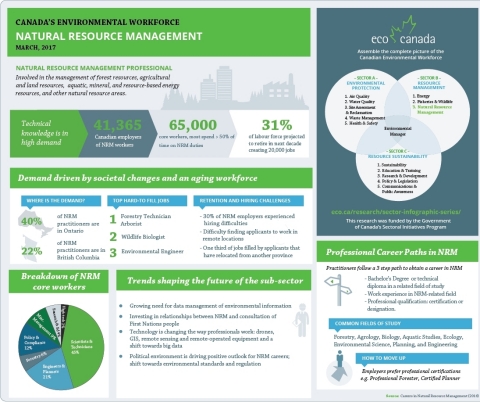90,000 Additional Jobs Expected To Be Created By 2024 In The Environmental Sector
The environmental employment sector is an important component of the Canadian economy. ECO Canada recently released a series of research findings demonstrating that this sector is projected to grow steadily and rapidly. Between 2015 and 2024, the core environmental workforce is projected to grow by 90,000 jobs.
This press release features multimedia. View the full release here: https://www.businesswire.com/news/home/20180502005430/en/

(Graphic: Business Wire)
Canada currently counts on 364,000 environmental professionals who combine knowledge, skills and experience to function at an elevated level in job duties that relate to environmental protection, natural resource management or sustainability. In the coming years, the environmental workforce is projected to grow by 24%, bringing the total workers involved in the sector to 464,000 by 2024.
ECO Canada’s research findings also indicate that 22% of the environmental workforce is expected to retire in the next ten years. This scenario will create opportunities for emerging practitioners to advance. In the past two years, 27% of hiring managers have increasingly prioritized recruiting recent post-secondary graduates. They consider candidates who demonstrate a strong desire to learn new technologies, and assimilate environmental legislation and regulatory type roles.
“It’s absolutely necessary to learn new technologies to work in the environmental sector. The use of drones is a clear example of how the field is leaning towards more precise ways of doing a job. An environmental worker in this day and age has to monitor or prevent situations with more sophisticated tools,” said Kevin Nilsen, President and CEO at ECO Canada.
Job opportunities in the environmental sector arise in specific industries and regions, mainly in Ontario, Alberta and British Columbia where the demand for environmental workers is high.
Natural Resource Management, Environmental Health and Safety, and Waste Management are the three major fields of practice that are hiring environmental professionals across Canada. Practitioners can use their skillset to work in diverse industries. According to recent findings: Agriculture; Construction; Professional Scientific and Technical Services; Administrative and Support, Waste Management and Remediation; and Public Administration are the top five industries with the highest concentration of environmental workers.
Governments’ commitment to protecting the environment is helping drive growth in fields of practice related to policy and legislation, waste management, and communications and public awareness. As public and private sector organizations, and academic institutions across the country take a more proactive role in addressing climate change, future employment potential will be greater in new roles such as Environmental Data Analysts and Climate Change Specialists.
“Climate Change is a relatively new field with a lot of potential for growth. Specialists in this area will play an essential role to understand patterns, predict outcomes and guide decisions that impact the future of our environment. As more projects to solve challenges come up, there will be higher demand for professionals that can contribute to solutions,” said Nilsen.
ECO Canada’s research also highlights that 60% of practitioners have college education or higher. When it comes to hiring the right candidates for environmental roles, job seekers need to:
- Adapt: the ability to perform both generalist and specialist functions
- Be flexible: consider working remotely or relocating to other regions based on where the work is
- Highlight soft skills: business communications, project management and data interpretation are highly desirable
“Everything we learn from all the ECO Canada research tells us that knowledge is key to being competitive in today’s environmental employment space. For those who follow a solid educational path, perhaps take a certification, learn about new technologies, and read a lot. The jobs are there,” said Joanne O’Connell, Director of Research at ECO Canada.
ECO Canada has been studying the Canadian environmental labour market for over two decades. Find the latest employment trends at a national and provincial level at eco.ca/research.
ABOUT ECO CANADA
Environmental Careers Organization of Canada (ECO Canada) is dedicated to developing programs that support the people growing the environmental sector. The organization provides training resources to find and keep the best environmental practitioners and inform key stakeholders of employment trends to ensure the ongoing prosperity of Canada’s growing environmental sector.
View source version on businesswire.com: https://www.businesswire.com/news/home/20180502005430/en/



